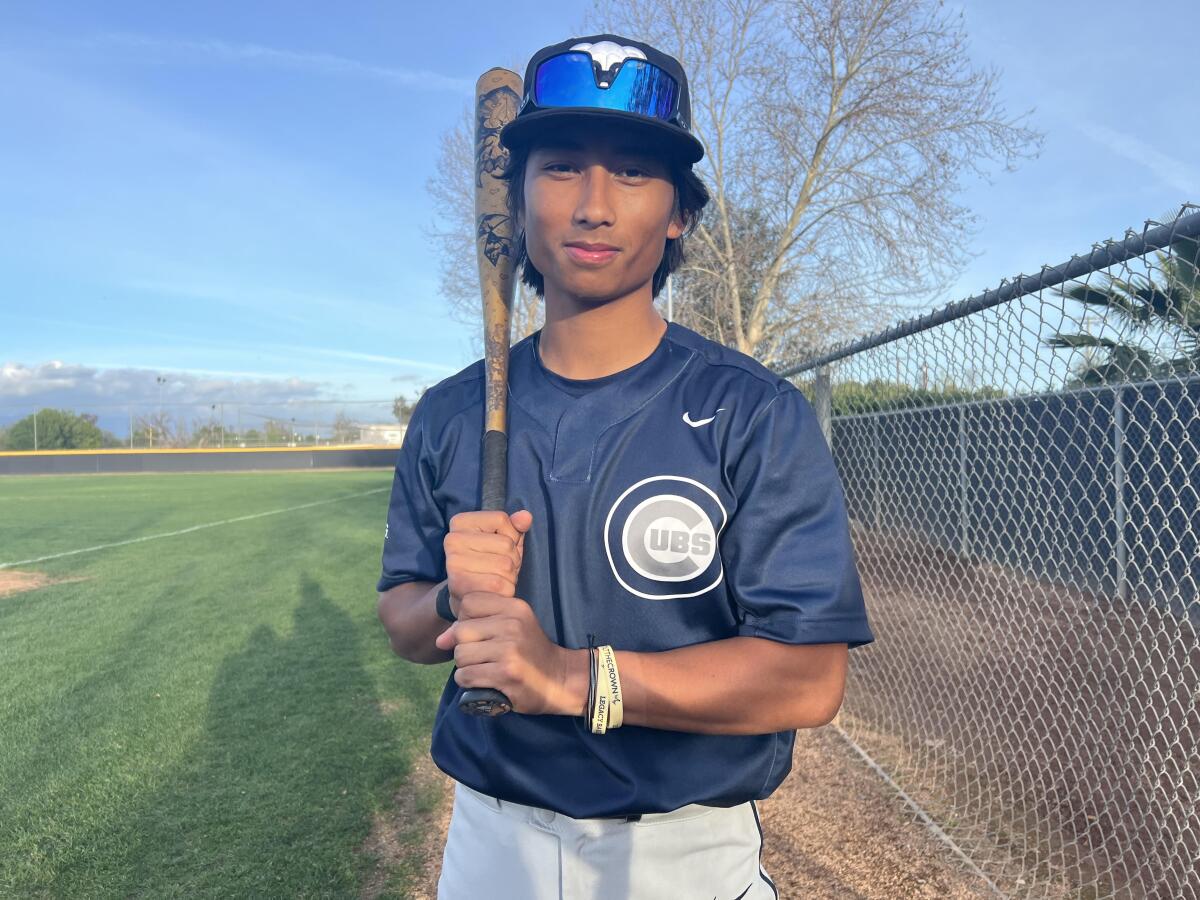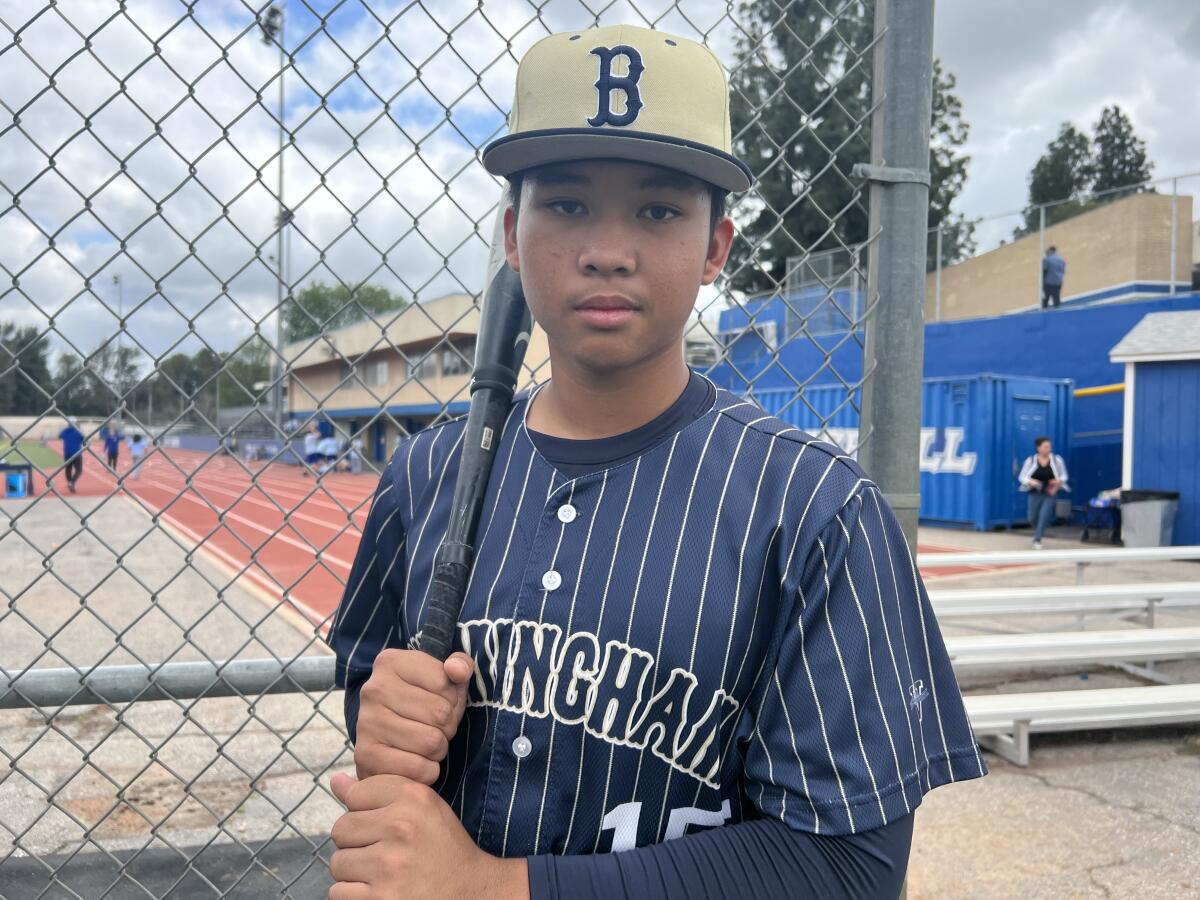Local Filipino American players pave way for baseball’s growth in Philippines

- Share via
Nestled in a clearing between rye fields and lush jungle, the bases on one of the few baseball diamonds in the Philippines’ Tanauan City sat in sludge.
In video taken by scouts visiting the area, a rooster crowed in the background and a dog watched from behind a rusty foul-line fence.
Baseball dreams hardly exist there, where kids play with fraying gloves and a cracked yellow bucket of cowhide-less baseballs. Yet to representatives visiting last summer from the Philippines national baseball team, the field represented promise.
“There is endless possibility out there,” said Bill Picketts, head coach of the Philippines national team. “There’s nothing. There’s no facilities.”
There are hundreds of kids with unbridled joy for the sport, as Picketts — also the head coach at L.A. Pierce College — saw during a summer trip to Tanauan City. Vince Sagisi, a former Major League Baseball scout of 13 years who’s now the Philippines national team’s recruiting coordinator, said he stumbled upon a 14-year-old with a wipeout three-pitch mix and a shortstop “making throws like Derek Jeter” on a six-week trip to the islands.
Baseball has long taken a backseat to basketball in Filipino culture. Picketts and Sagisi, though, look at the Philippines as the next Dominican Republic: an international gold mine for baseball scouting.
“I’ve always believed there’s talent there,” Sagisi said. “It could be the next big Asian market to take off.”
Growing the game in the Philippines, the national team believes, starts with a pipeline to Los Angeles as a slew of Filipino American talent is popping up across the Southland. Over the summer, much of that talent played together on a youth national team alongside a couple of players from the Philippines.
For many, it inspired hope they could help build a baseball culture in the Philippines — and turn the region into a force on the world’s biggest stage.
“Playing for a nationality, building it up now, I think it’d be really important for me to play on the [World Baseball Classic] team,” said Loyola’s Adam Magpoc, who is half-Filipino and has committed to Boston College.
“I was here when it started,” Magpoc continued. “So I’m going to be there when it’s successful.”
These days, JB Dalumpines’ voice rarely raises above a mutter.
In youth baseball, the Birmingham High third baseman used to be loud. Then he noticed there wasn’t anyone who looked like him sitting in the dugout and started to feel he didn’t belong.

When he was 10, he was standing at third in a travel-ball game when a parent yelled at him from the stands. Dalumpines doesn’t remember exactly what — “something racist,” he said — but the words hit like a blow to the stomach.
“It hurt me first, but then it started to motivate me,” Dalumpines said. “Like, I got to prove that guy wrong.”
The lack of Filipino representation in baseball is stark; only a handful of players of Filipino descent have played in the majors. Sagisi once was a scouting supervisor for the Cleveland Guardians, assigned to the Los Angeles and Central California areas. Filipino American players were, as he said, “hard to find.”
Beacons have started to pop up across the Southland. Dalumpines and Taft’s Elijah Gaviola play in the City Section; Magpoc, Harvard-Westlake’s Kai Caranto and Sherman Oaks Notre Dame’s Kai Gonzaga are all standouts on strong Mission League teams.
More than a dozen others extend across schools from West L.A. to the Inland Empire. And most came together to share a dugout for the youth Philippines national team over the summer.
“It opened up my eyes,” Redondo Union’s Kyler Gloth said, “to the possibilities.”
This summer, Picketts is planning college showcases for that youth team and a “Filipino World Series” at Pierce College to pull together a range of talent across the world. The goal is simple — grow the number of college-level Filipino American players in Los Angeles to provide exposure for players in the Philippines.
“It’s important to show the kids there is a path,” said Picketts’ son Will, the national team’s director of baseball operations. “Kids like Magpoc and JB that can lead the way for our very first group of Filipino players … are very important.”
The Philippines has never qualified for the World Baseball Classic. With Japan winning this year’s WBC, Sagisi said, it should serve as motivation.
Before every game last summer, players on the youth national team would utter a simple war cry: “Laban!”
It’s the Philippines’ informal version of a “Let’s go!” More precisely translated in Tagalog, a major language of the Philippines:
“A fight!”
More to Read
Get our high school sports newsletter
Prep Rally is devoted to the SoCal high school sports experience, bringing you scores, stories and a behind-the-scenes look at what makes prep sports so popular.
You may occasionally receive promotional content from the Los Angeles Times.







